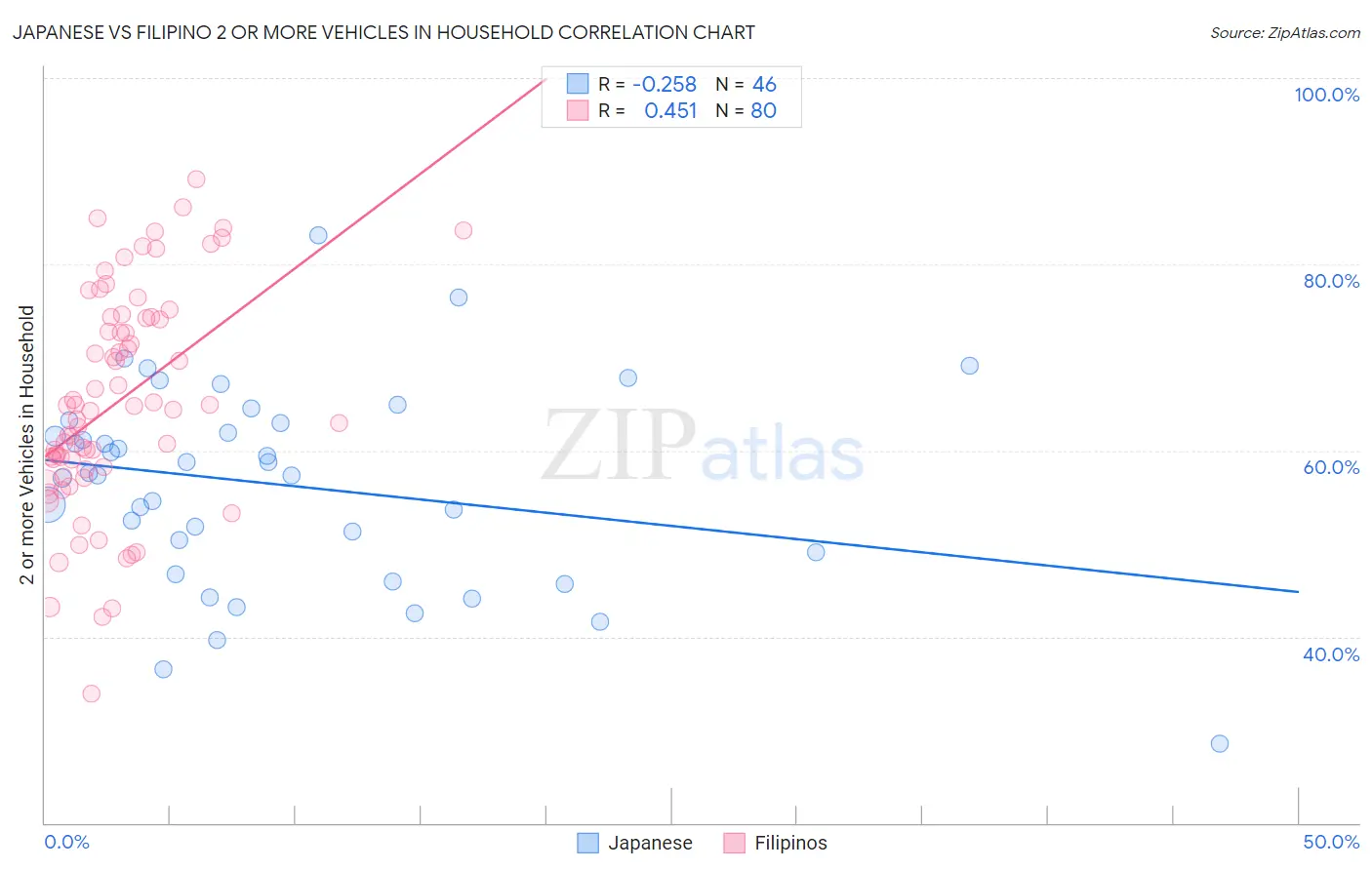Japanese vs Filipino 2 or more Vehicles in Household
COMPARE
Japanese
Filipino
2 or more Vehicles in Household
2 or more Vehicles in Household Comparison
Japanese
Filipinos
57.5%
2 OR MORE VEHICLES IN HOUSEHOLD
98.0/ 100
METRIC RATING
110th/ 347
METRIC RANK
57.8%
2 OR MORE VEHICLES IN HOUSEHOLD
98.9/ 100
METRIC RATING
94th/ 347
METRIC RANK
Japanese vs Filipino 2 or more Vehicles in Household Correlation Chart
The statistical analysis conducted on geographies consisting of 249,112,523 people shows a weak negative correlation between the proportion of Japanese and percentage of households with 2 or more vehicles available in the United States with a correlation coefficient (R) of -0.258 and weighted average of 57.5%. Similarly, the statistical analysis conducted on geographies consisting of 254,177,866 people shows a moderate positive correlation between the proportion of Filipinos and percentage of households with 2 or more vehicles available in the United States with a correlation coefficient (R) of 0.451 and weighted average of 57.8%, a difference of 0.57%.

2 or more Vehicles in Household Correlation Summary
| Measurement | Japanese | Filipino |
| Minimum | 28.6% | 33.9% |
| Maximum | 83.2% | 89.1% |
| Range | 54.6% | 55.2% |
| Mean | 56.3% | 65.2% |
| Median | 57.5% | 64.5% |
| Interquartile 25% (IQ1) | 49.1% | 58.1% |
| Interquartile 75% (IQ3) | 63.0% | 74.3% |
| Interquartile Range (IQR) | 13.8% | 16.2% |
| Standard Deviation (Sample) | 10.8% | 11.8% |
| Standard Deviation (Population) | 10.6% | 11.7% |
Demographics Similar to Japanese and Filipinos by 2 or more Vehicles in Household
In terms of 2 or more vehicles in household, the demographic groups most similar to Japanese are Immigrants from North America (57.5%, a difference of 0.020%), Greek (57.5%, a difference of 0.030%), Pueblo (57.5%, a difference of 0.040%), Immigrants from Canada (57.5%, a difference of 0.050%), and Immigrants from Netherlands (57.5%, a difference of 0.060%). Similarly, the demographic groups most similar to Filipinos are Hmong (57.8%, a difference of 0.020%), Shoshone (57.9%, a difference of 0.060%), Ottawa (57.9%, a difference of 0.060%), Burmese (57.8%, a difference of 0.060%), and Slavic (57.8%, a difference of 0.080%).
| Demographics | Rating | Rank | 2 or more Vehicles in Household |
| Shoshone | 99.0 /100 | #92 | Exceptional 57.9% |
| Ottawa | 99.0 /100 | #93 | Exceptional 57.9% |
| Filipinos | 98.9 /100 | #94 | Exceptional 57.8% |
| Hmong | 98.9 /100 | #95 | Exceptional 57.8% |
| Burmese | 98.8 /100 | #96 | Exceptional 57.8% |
| Slavs | 98.8 /100 | #97 | Exceptional 57.8% |
| Palestinians | 98.6 /100 | #98 | Exceptional 57.7% |
| Cajuns | 98.5 /100 | #99 | Exceptional 57.7% |
| Fijians | 98.4 /100 | #100 | Exceptional 57.6% |
| Lebanese | 98.3 /100 | #101 | Exceptional 57.6% |
| Immigrants | Bolivia | 98.2 /100 | #102 | Exceptional 57.6% |
| Jordanians | 98.2 /100 | #103 | Exceptional 57.6% |
| Immigrants | Indonesia | 98.2 /100 | #104 | Exceptional 57.6% |
| Immigrants | Korea | 98.2 /100 | #105 | Exceptional 57.6% |
| Immigrants | Oceania | 98.2 /100 | #106 | Exceptional 57.5% |
| Immigrants | Netherlands | 98.2 /100 | #107 | Exceptional 57.5% |
| Immigrants | Canada | 98.1 /100 | #108 | Exceptional 57.5% |
| Immigrants | North America | 98.1 /100 | #109 | Exceptional 57.5% |
| Japanese | 98.0 /100 | #110 | Exceptional 57.5% |
| Greeks | 98.0 /100 | #111 | Exceptional 57.5% |
| Pueblo | 98.0 /100 | #112 | Exceptional 57.5% |